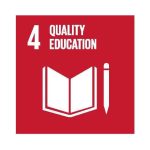
Image source: cnnindonesia.com
Most cited UGM’s scientific articles on 17 SDGs subjects in Scopus for the past 10 years until 14 September 2023 are:
- No poverty, Factors Determining Social and Environmental Reporting by Indian Textile and Apparel Firms: A Test of Legitimacy Theory gained 39 citations;
- Zero hunger, Regional Impact Assessment of Land use Scenarios in Developing Countries using the FoPIA Approach: Findings from Five Case Studies gained 54 citations;
- Good health and well-being, Severe Acute Respiratory Syndrome Coronavirus 2 (SARS-CoV-2): An overview of viral structure and host response gained 637 citations;
- Quality education, Educational environment and approaches to learning of undergraduate nursing students in an Indonesian School of Nursing gained20 citations;
- Gender equality, ‘Elastic band strategy’: women’s lived experience of coping with domestic violence in rural Indonesia gained 23 citations;
- Clean water and sanitation, Underreporting of high-risk water and sanitation practices undermines progress on global targets gained 28 citations;
- Affordable and clean energy, Liquid hydrogen, methylcyclohexane, and ammonia as potential hydrogen storage: Comparison review gained 236 citations;
- Decent work and economic growth, Role of research and development in green economic growth through renewable energy development: Empirical evidence from South Asia gained 103 citations;
- Industry, innovation and infrastucture, Framing the sharing economy: A media analysis of ridesharing platforms in Indonesia and the Philippines gained 38 citations;
- Reduced inequalities, Addressing the unequal geographic distribution of specialist doctors in Indonesia: The role of the private sector and effectiveness of current regulations gained 58 citations;
- Sustainable cities and communities, Fuel Oil Production from Municipal Plastic Wastes in Sequential Pyrolysis and Catalytic Reforming Reactors gained 249 citations;
- Responsible consumpsition and production, Improvement of Biogas Production from Orange Peel Waste by Leaching of Limonene gained 116 citations;
- Climate action, The human cost of global warming: Deadly landslides and their triggers (1995–2014) gained 197 citations;
- Life below water, Mangrove biomass carbon stock mapping of the Karimunjawa Islands using multispectral remote sensing gained 67 citations;
- Life on land, Object-Based Approach for Multi-Scale Mangrove Composition Mapping Using Multi-Resolution Image Datasets gained 135 citations;
- Peace, justice and strong institutions, A Multilab Preregistered Replication of the Ego-Depletion Effect gained 611 citations;
- Partnership for the goals, Use of and barriers to access to opioid analgesics: a worldwide, regional, and national study gained 383 citations;
During the ‘SDGs-focused Publication Press Release Workshop’ held on Tuesday, September 13, 2023, at the Sidomukti Conference Room, MM UGM, Prof. Dr. Wening Udasmoro, Vice Rector for Research and Education, emphasized the importance of citations in her remarks. In line with Prof. Wening, Prof. Indra Wijaya Kusuma, MBA, Ph.D., who serves as the Head of University Quality Assurance and Reputation Unit, also emphasized that “Citations are a crucial indicator in university rankings and are a natural outcome that cannot be manipulated,” said Indra Wijaya Kusuma.
In another context, the Director of Research, Prof. Mirwan Ushada, expressed high appreciation for the authors whose article received the highest number of citations. The article, titled “Severe Acute Respiratory Syndrome Coronavirus 2 (SARS-CoV-2): An Overview of Viral Structure and Host Response,” achieved an impressive 637 citations. This article, published in the journal “Diabetes and Metabolic Syndrome: Clinical Research and Reviews,” was authored by Dr. Med, Dr. Indwiani Astuti from the Faculty of Medicine and Public Health. “Congratulations to Dr. Med, Dr. Indwiani Astuti,” said Prof. Mirwan.
Writers: Kiki & Syahrul
Translator: Zahra

